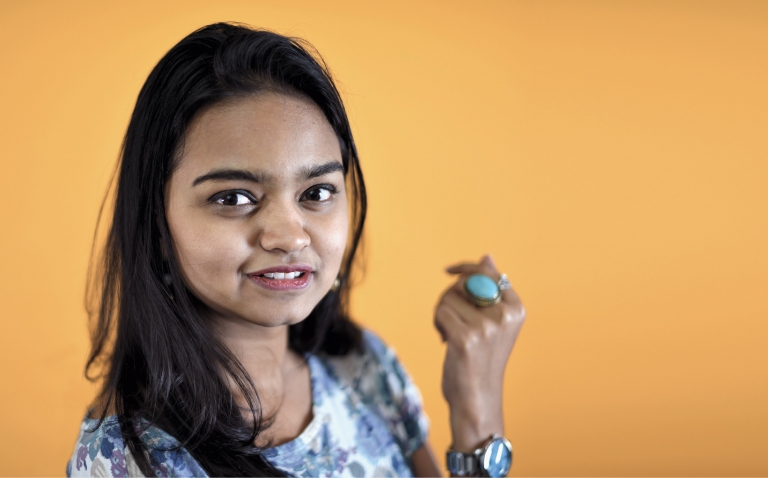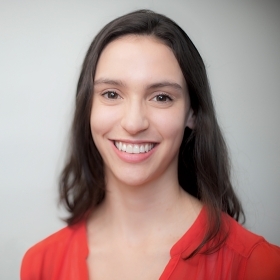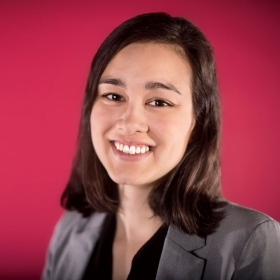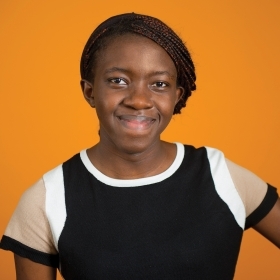On Oct. 11, 2013, the United Nation’s International Day of the Girl, Kavindya Thennakoon ’19 addressed Sri Lanka’s Parliament about the state of girls and young women in the country. She spoke passionately about her work with the Girl Guides Association developing a sex-education curriculum for teachers around Sri Lanka, and was frank about the ways that her country was failing girls and young women.
Little did Thennakoon know that two Wellesley alumnae were listening, rapt, in the audience: Michele Sison ’81, then U.S. Ambassador to Sri Lanka and the Maldives, and Antonia De Meo ’89, then the UNICEF deputy representative to Sri Lanka. Soon after the event, De Meo asked Thennakoon, who had recently graduated from high school, to work at the U.N. to help the organization engage young people with its decision making. Thennakoon took the job, and De Meo became her mentor, friend, and champion.
A year later, De Meo left Sri Lanka to take a job with the U.N. in Jordan. “Right as she was leaving, she said, ‘You need a proper education, and you need a skill set and a wonderful network that will amplify the work you do here,’” Thennakoon remembers. “And I said, ‘What do you mean? College is so expensive.’” De Meo talked to her about Wellesley, and said, “Just apply.” Later, Thennakoon says, De Meo admitted that after Wellesley’s application deadline, De Meo wrote to the Office of Admission advocating for her … more than a few times. “I think that’s when I realized that Wellesley has something so special, that when these women recognize some talent, they just go out of their way. That still blows my mind,” Thennakoon says.
At first, Thennakoon thought she’d become an economics major—a path to a high-paying job. When she was 2 years old, her father, a police officer, was murdered, and her mother raised her alone. She thought she’d work on Wall Street for a while and pay off her mother’s debts. But after a two-day program at a large investment bank in Chicago, she knew her heart wouldn’t be in it. When she came back to campus, she decided to follow her passion and became an anthropology major.
Thennakoon’s coursework in anthropology changed the way she thinks about her community development work in Sri Lanka, which she continued from Wellesley. “[Anthropology courses] helped me figure out that I need to always critically question the work I’m doing,” she says. “The community always knows best, and we need models that are participatory, where we give control and leadership to the communities.”
Thenakoon founded an organization, Without Borders, that aims to connect teachers and students in rural Sri Lanka with innovative training and education models. It runs three Idea Labs that offer a curriculum focused on language skills, creative thinking, and leading change. Inspire Lab is a yearlong program for young women, focused on leadership, career development, and community organizing, and is supported by the Pan Asia Women’s Association. Ideator, the organization’s newest project, uses a hackathon-style model to encourage young people to find solutions to problems in their communities, and is supported by the Ministry of Education in Sri Lanka.
When the magazine interviewed Thennakoon, Sri Lanka was in political turmoil after President Maithripala Sirisena appointed the country’s previous president, Mahinda Rajapaksa, who had been accused of human rights abuses, as prime minister. Thennakoon was in shock, and she feared for the progress Without Borders had made, with help from the government.
When Thennakoon spoke to her mother after the news broke, she asked her if everything she had worked for would come to nothing. Her mother, who works at one of the Idea Labs, emphatically told her no, because the students and teachers they have trained are future voters and policymakers. “She told me, ‘What we’re doing is essentially helping create this wonderful set of change-makers who will take over. And that’s why the work is important. You might not live to see the results, but it will happen,’” Thennakoon says. And Thennakoon, who hasn’t even graduated from Wellesley yet, has many years ahead to make sure that the change she wants to see happens.








We ask that those who engage in Wellesley magazine's online community act with honesty, integrity, and respect. (Remember the honor code, alums?) We reserve the right to remove comments by impersonators or comments that are not civil and relevant to the subject at hand. By posting here, you are permitting Wellesley magazine to edit and republish your comment in all media. Please remember that all posts are public.